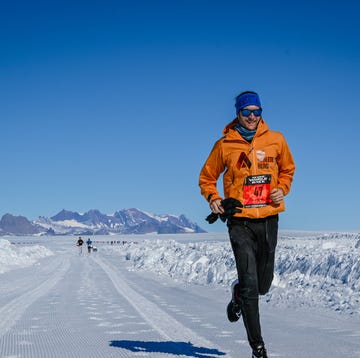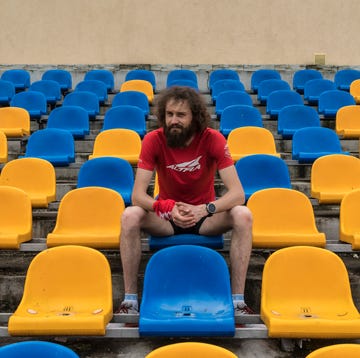Megan Skeels has been a high school star, collegiate All-American, sponsored professional and Olympic Trials marathoner. The 42-year-old Texan has a coach who has been one of the country’s top road racers. She’s a meticulous athlete who balances caring for her three children with long runs of up to 24 miles.
So why, with 30 years of running experience and an array of masters titles, did Skeels wound up vomiting six times before the start of this year’s Boston Marathon?
Was the culprit the special protein-packed pancake Skeels had for breakfast? Or the fish oil supplement she took? Or the carbohydrate drink promoted by Olympians that Skeels added to her energy mix? Perhaps it was all of the above plus nerves. Skeels was at a high pitch of excitement and anxiety as she got ready that April morning for her first Boston.
“I was nauseous immediately,” Skeels says about her pre-race meal. “It was a horrific experience. By the start, I’d lost everything I needed to sustain me.”
Even so, Skeels went on to run 2:55:15 to place fourth in the women’s masters division and win $1,500. She’d run 2:46:39 in her Boston qualifier, the first woman overall in the Mohawk Hudson Marathon in Albany, six months before, and thinks she could have run another mid-2:40s performance if not for her gastric distress.
Now, as the Aledo resident embarks on her preparation for the 2017 Boston Marathon, she’s intent on avoiding a repeat stomach-churning energy crash by confronting her burdensome athletic conflicts.
Advertisement - Continue Reading Below
A 10-time All-American at the University of Arkansas in the mid-‘90s, Skeels’ approach is to run like she is 42 going on 21. She’s always looking for an extra edge, a way to push harder, some bit of arcane nutrition to make her faster. “All my life,” Skeels says, “I’ve gotten confidence from doing ‘more’ with the idea that more equals better. I always feel like I want to be that senior at Arkansas training at full capacity.”
Since Skeels resumed high-level competition in 2010 after her second child turned 2, she has had just the right coach—Jon Sinclair of Fort Collins, Colorado—to help her balance the hard/easy conundrum of mid-life marathon excellence. In his prime in the 1980s, Sinclair won several leading road races and was a 2:13 marathoner.
“Jon is very scientific,” says Skeels, who works part-time out of her home creating family scrapbooks. “He wants to know your heart rate, sleep pattern, what you eat, the whole person. He tells me that if I do what he asks, I’ll be ready to race and not be sick or exhausted. It’s nice to have someone rein me in when I’m out of control.”
Still, the tug of Skeels’ earlier stardom has been hard for her to shake. At Trinity Valley High School in Fort Worth, Skeels (then Flowers) was a Foot Locker (then Kinney) national cross-country finalist all four years, placing as high as sixth in 1989.
Skeels went to Villanova on a scholarship, and as a freshman was a member of the Wildcats’ 1992 NCAA women’s championship cross-country team, which also included future three-time Olympian Jen Rhines. But Skeels got homesick, and after that season transferred to Arkansas, a six-hour drive from her Texas home. As a Razorback, Skeels had another future Olympian as a teammate, the 2004 marathon bronze medalist Deena Kastor (then Drossin). Skeels’ collegiate highlights included a Southeast Conference 3,000-meter title and a 5,000-meter time of 16:02.95 that just missed putting her into the 1996 Olympic trials.
After college, Skeels was able to get a professional contract with Adidas, but it was short-lived. Once married and starting a family, Skeels ran through her pregnancies but did not compete seriously for many years. She felt something missing from her running career.
Running Was His Life. Then Came Putin’s War
In 2009, with the idea of running the 2012 Olympic marathon trials taking root, Skeels embarked on marathon training, 55 miles a week, as an experiment. In her first major race, in January 2010, Skeels, then 35, won the Texas Half Marathon in Dallas, defeating the entire field in 1:20:35.
Skeels decided to enlist Sinclair as her coach. That November, in her marathon debut, she ran 3:01:54. In the next 12 months, she ran three more marathons trying to run 2:46 or faster to attain a trials qualifier. In the last one, on December 4, 2011, just 10 days before the deadline, Skeels ran 2:43:51 at California International to earn a spot in the trials.
Because the trials, in Houston, were only 41 days later, Skeels, with Sinclair’s guidance, had to balance her recovery with tune-up workouts that would keep her fresh for her fifth marathon in 15 months. At the trials, Skeels wound up running a PR 2:42:40 for 59th place in the field of 152 women.
In 2013, Skeels had her third child. In 2014, she turned 40. Facing time-management challenges, like securing naps after long runs, Skeels says that when she wants to embark on marathon planning, she first consults with her “board of directors”: husband David and children Max (11), Scarlett (8) and Mason (3).
In David, Megan has an ideal chairman of the board. He was a top athlete himself, spending five years as a minor league ballplayer and coach with the Seattle Mariners, Oakland A’s and Texas Rangers organizations.
David has helped Megan—who admits having a hard time believing that more isn’t always better—find the balance that Sinclair advocates. “I’m beginning to respect what my body can handle,” she says. “Being hard on myself is my first inclination but in the maturing process you learn that sometimes backing off can be a strength instead of a weakness.”
For marathon training, Skeels logs 65 miles a week. Weekdays, she typically gets up at 4:30 A.M. for a 5:15 workout, finishing before David, an attorney, and the kids are out of bed. She runs in the darkness with a light on her cap.
As Skeels launches her Boston build-up with hopes of contending for the masters title, she’s buoyed by performances such as the 1:21:38 half marathon she ran last March as her last test before her digestive episode in Boston.
Even if Skeels can allow herself any training let-up in the coming months, on most Saturdays she will go out and run up to 24 miles, often with some of the miles faster than goal marathon pace. Afterwards, she’ll explain to her three children that if she’s feeling a little grumpy, please excuse Mommy—she must do what the Boston Marathon requires.

Marc Bloom’s high school cross-country rankings have played an influential role in the sport for more than 20 years and led to the creation of many major events, including Nike Cross Nationals and the Great American Cross Country Festival. He published his cross-country journal, Harrier, for more than two decades.













